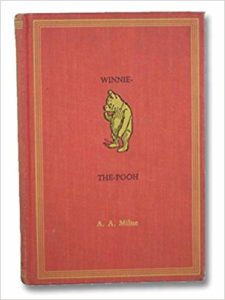
My absolute favorite explanation of how poetry works is said by Winnie-the-Pooh to Piglet. The passage occurs in the story “In Which Eeyore Finds the Wolery and Owl Moves Into It” from The House at Pooh Corner. 
Piglet has just saved the day — or, in A.A. Milne’s words, “done a very grand thing.” To commemorate the brave deed, Pooh has composed a Hum (a poem) with seven verses.
Seven? said Piglet as carelessly as he could. “You don’t often get seven verses in a Hum, do you, Pooh?”
“Never,” said Pooh. “I don’t suppose it’s ever been heard of before.”
Pooh sings all seven verses to Piglet, who “just stood and glowed.” When it ends, Piglet has a question of the poet:
“Did I really do all that?” he said at last.
Well,” said Pooh, “in poetry—in a piece of poetry—well, you did it, Piglet, because the poetry says you did. And that’s how people know.”
This, dear poetry people, is how poems work. Poems are true because the poetry says they are.
Poetry isn’t memoir, which needs to be carefully weighed against that house of cards called memory. It’s not nonfiction or journalism, which needs to be fact-checked. But it’s also not quite fiction either. It lives in its own space. It even has its own section in the library or at the bookshop.
So play. Have fun. If you feel moved to compose seven verses in your hum, go for it. If not, a haiku will do.
Recently I was working on a poem that has been kicking around for a few years. It’s about a rainbow I saw in a football stadium while I was supposed to be watching the game. But I couldn’t stop watching the rainbow.
In an earlier version of the poem, I’d already changed the stadium where the rainbow occurred. Not the shiny new McLane Stadium, but the beast that was Floyd Casey, now demolished. I published a version of the poem on my blog in 2016, but looking back, it wasn’t quite right. Then I saw a prompt to write sports-inspired poems, and I thought I’d dust off my poem and rework it.
And I thought of Piglet. Because while I was watching the rainbow, I was thinking of someone who always loved that character. Why not put him there with me? It’s what Pooh would do. How else will people know?
Floyd Casey Stadium
This is not what forgiveness is supposed to look like—
fast-food tacos and football.
The game should be reason enough to talk
but as players flatten each other
we watch with flat faces.
The forecast warned of a storm and lightning lit
somewhere but not near
us. I stare at the sky,
sit through a touchdown. You sit too.
The ethos eludes us.
It seems gratuitous to mention the rainbow
really too on the nose, especially
when we cannot string together two words
to say to each other.
But there it is stubbornly
shining through our
recalcitrance.
You point: My first rainbow.
No, I say, there was that one in Colorado.
We both look up.
At the mountain house? you ask.
I nod.
— Megan Willome
Photo by 白士 李, Creative Commons, via Flickr. Post by Megan Willome.
Browse more Pooh
“Megan Willome’s The Joy of Poetry is not a long book, but it took me longer to read than I expected, because I kept stopping to savor poems and passages, to make note of books mentioned, and to compare Willome’s journey into poetry to my own. The book is many things. An unpretentious, funny, and poignant memoir. A defense of poetry, a response to literature that has touched her life, and a manual on how to write poetry. It’s also the story of a daughter who loses her mother to cancer. The author links these things into a narrative much like that of a novel. I loved this book. As soon as I finished, I began reading it again.”
—David Lee Garrison, author of Playing Bach in the D. C. Metro
- Perspective: The Two, The Only: Calvin and Hobbes - December 16, 2022
- Children’s Book Club: A Very Haunted Christmas - December 9, 2022
- By Heart: ‘The night is darkening round me’ by Emily Brontë - December 2, 2022

L.L. Barkat says
Why poetry? This… 🙂
“Poetry isn’t memoir, which needs to be carefully weighed against that house of cards called memory. It’s not nonfiction or journalism, which needs to be fact-checked. But it’s also not quite fiction either. It lives in its own space.”
And, so, we get to live in a certain kind of spacious space, too, when we enter a poem.
Megan Willome says
I guess I’m always answering the question “Why poetry?”
It’s the spacious nature of poetry that keeps me in it, I think.
Bethany R. says
I like how you share about coming back to a poem again after sharing it on your blog. Fun to hear too how you incorporate Pooh & Co. into this. 🙂
Megan Willome says
Thank you, Bethany. Pooh’s views on poetry are under-appreciated. Disney has no idea.
Rebecca D. Martin says
Wonderful reading of Pooh, and very moving poem. It made me stop short. That ending.
Your Joy of Poetry is on my to-read list. 🙂
Megan Willome says
That makes me happy to hear, Rebecca!
The ending was part of the revision. It didn’t exist before.